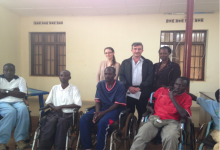
A Universalia team, comprised of Yvan Conoir, Brigitte Izabiriza and Marie-Laure Talbot, recently evaluated the progress made by the Rwanda Second Emergency Demobilisation and Reintegration Programme.
Since 1997, Rwanda demobilizes different categories of combatants: ex-armed groups (present in the Democratic Republic of Congo), ex-FAR (Forces armées rwandaises), ex-RPA (Rwanda Patriotic Forces), as well as ex-RDF (Rwanda Defense Forces). Following a Pre-Discharge Orientation Programme (PDOP) given as part of the demobilization process at Mutobo Demobilisation and Reintegration Resource Centre, ex-combatants receive reinsertion kits. This leads the way to an economic reintegration process, which includes services such as reintegration grants and vocational trainings for ex-combatants eligible for the Vulnerable Support Window program. Based on years of experience, Rwanda came to the conclusion that professional training and posting – often within cooperatives created by ex-combatants – is a better way to encourage socioeconomic reintegration of ex-combatants than income generating activities.
One notable point is the fact that, since 2007, the government of Rwanda has deployed significant efforts to promote the socioeconomic reintegration of disabled ex-combatants within their communities, through the provision of different services: building of special needs housing, subsistence allowances, health insurance (mutuelle de santé), full coverage of medical fees, support for the creation of cooperatives, building of production centers within disabled ex-combatants’ settlement sites, etc.

